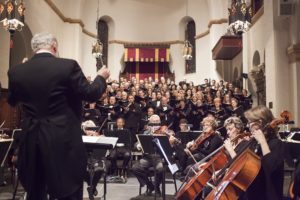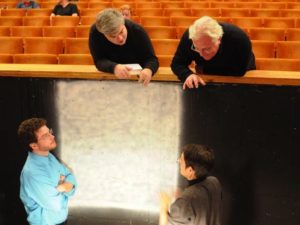 Paul Moravec and I are headed down to Florida this weekend for our latest premiere: John Sinclair and the Bach Festival Society of Winter Park are giving the first performance of our latest collaboration, an anthem for chorus and orchestra called Music, Awake! It was commissioned by the Bach Festival Society in honor of John’s twenty-fifth anniversary its artistic director. In addition to writing the text, I also wrote program notes for the premiere, which takes place on Saturday at 7:30 in Rollins College’s Knowles Memorial Chapel. The program, which will be repeated on Sunday at three p.m., also includes a complete performance of Beethoven’s Ninth Symphony.
Paul Moravec and I are headed down to Florida this weekend for our latest premiere: John Sinclair and the Bach Festival Society of Winter Park are giving the first performance of our latest collaboration, an anthem for chorus and orchestra called Music, Awake! It was commissioned by the Bach Festival Society in honor of John’s twenty-fifth anniversary its artistic director. In addition to writing the text, I also wrote program notes for the premiere, which takes place on Saturday at 7:30 in Rollins College’s Knowles Memorial Chapel. The program, which will be repeated on Sunday at three p.m., also includes a complete performance of Beethoven’s Ninth Symphony.
For more information or to order tickets, go here.
Here are my program notes, which will give you some idea of what the new piece sounds like. I hope you can come!
* * *
When the Bach Festival Society asked Paul Moravec and me to write a piece in honor of John Sinclair’s silver anniversary as its artistic director, it struck me at once that it should be an ode to music. Many great composers of the past, among them Handel, Purcell, Schubert, Chabrier, Vaughan Williams, and Britten, have written such works, and I thought it would be appropriate for us to seek to follow in their footsteps.
Not surprisingly, Paul agreed. “Everything a composer writes is, in part, an ode to music,” he says. “A musician devotes himself to an art that continually illumines his life with joy. Making music is a privilege, and sharing its power an honor. A composer shows his dedication to the muse through daily effort to achieve the ideal sound, the right harmony, the memorable melody. He expresses his thanks because, deep down, he knows that the art somehow justifies his being. As W.H. Auden says in his own ode to music: ‘You alone, alone, O imaginary song/Are unable to say an existence is wrong/And pour out your forgiveness like a wine.’”
 In search of inspiration for the text, I looked at the last scene from The Winter’s Tale, a play that Paul and I both love, and found these words: “Music, awake her; strike!/’Tis time; descend; be stone no more; approach;/Strike all that look upon with marvel.” All at once the idea for a poem about music came to me. It would be what rhetoricians call an “apostrophe,” an exclamatory passage in which an inanimate object or idea—in this case, music itself—is addressed directly, as if it were alive. The poem, I thought, could be about what music does to us when we hear it and are, like Shakespeare’s Hermione, transformed by its magical power.
In search of inspiration for the text, I looked at the last scene from The Winter’s Tale, a play that Paul and I both love, and found these words: “Music, awake her; strike!/’Tis time; descend; be stone no more; approach;/Strike all that look upon with marvel.” All at once the idea for a poem about music came to me. It would be what rhetoricians call an “apostrophe,” an exclamatory passage in which an inanimate object or idea—in this case, music itself—is addressed directly, as if it were alive. The poem, I thought, could be about what music does to us when we hear it and are, like Shakespeare’s Hermione, transformed by its magical power.
I began by changing Shakespeare’s first line to the more direct “Music, awake!” Next I decided to build the first stanza of the poem around “a,” “e,” “i,” “o,” and “u,” the five vowels that are the basis for all english-language singing. Seven hours later, at the end of a sleepless night of nonstop writing, I finished the first draft. As we did in our three operas, Paul and I then worked closely together to shape and simplify my words in ways that would inspire him musically.
“Music, Awake!” begins, as befits a festival, with a resplendent explosion of sound set in what Robert Browning called “the C Major of this life.” Dark clouds pass across the sonic sky as the soprano soloist implores “blesséd music” to “console us… and grant us peace,” but doubt is dispelled by the return of the opening choral fanfare, followed by what I hope Paul, who is modest to a fault, will forgive me for describing as a truly grand peroration.
To all this I need only add that we are proud and happy to have been invited to help commemorate this occasion. John is a distinguished musician—and a close friend. We hope that you find our joint contribution to this celebratory concert to be a fitting tribute to his great work.
* * *
UPDATE: To read the Orlando Sentinel’s story abut Music, Awake!, go here.
